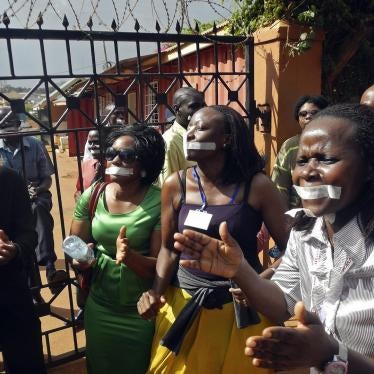Uganda must allow the opposition Forum for Democratic Change (FDC) to organize campaign rallies for its jailed presidential candidate, Dr. Kizza Besigye, Human Rights Watch said today.
The government has tried to stop demonstrations related to the November 14 arrest of Besigye on charges of rape and treason in the High Court. He was declared a candidate only days before his trial was to start in the High Court today. On November 22, the government banned public rallies and demonstrations related to Besigye’s trial, claiming the protests would prejudice the courts and interfere with the defendant’s constitutionally protected right to a fair trial. Between November 22 and 24, police arrested opposition leaders who were planning rallies for November 24, the day Besigye was scheduled to appear in the High Court to hear the verdict on his bail application.
“Ugandans have a right to peacefully protest against Besigye’s trial and rally in support of his campaign,” said Jemera Rone, Uganda researcher at Human Rights Watch. “The authorities cannot use the Besigye trial as a pretext to prevent opposition rallies now that the campaign season is in full swing.”
Human Rights Watch is concerned that authorities will use the ban to obstruct campaign rallies by the Forum for Democratic Change, during Uganda’s first multi-party elections in 25 years. Besigye is considered the main challenger to President Yoweri Museveni, who seeks a third term in office. Presidential and parliamentary elections are scheduled to take place on February 23, 2006.
Human Rights Watch is also concerned about reports that security forces have intimidated, harassed and physically assaulted opposition party supporters since Besigye’s return to Uganda in late October. In December, Human Rights Watch interviewed supporters of the Forum for Democratic Change from Kampala and the Kabarole district in western Uganda. They told Human Rights Watch that since Besigye’s arrest, local government officials and members of the security forces—including the police, Internal Security Organization, and Ugandan Peoples’ Defense Forces (UPDF)—had ordered them to stop supporting Besigye, either threatening them or using physical violence.
An FDC activist from the Kabarole district told Human Rights Watch that police prevented him from organizing a protest against Besigye’s arrest. Later that night, several UPDF soldiers arrested him and took him to a nearby military barracks, where they beat him, tied him to a tree, and threatened to kill him by firing squad if he continued to support Besigye.
“It is up to the independent Electoral Commission and the police to see that the 2006 elections are free from intimidation and violence,” said Rone. “The commission must promptly investigate allegations of any abuse and ensure that perpetrators of violence are held accountable.”
Background:
Dr. Besigye challenged President Museveni in the presidential elections of March 2001 and lost. He appealed to the Supreme Court, which ruled 3-2 that there had been fraud and violence in the elections, but then ruled 3-2 that the fraud and violence was not sufficient to set aside the election results. Dr. Besigye fled into exile a few months later.
In October 2005, he returned to Uganda to run again for president. On November 15, he was charged with rape and treason before the High Court and remanded to Luzira Prison near Kampala. His arrest provoked demonstrations and some looting in Kampala. On November 24, Besigye was charged with terrorism and illegal possession of firearms before the General Court Martial. Although the High Court granted bail to Besigye on November 25, he remains in Luzira Prison because of the court martial charges.
On December 12, High Court Justice Remmy Kasule extended a stay on Besigye’s trial before the General Court Martial until the Constitutional Court rules on the legality of the military trial. The military court hearing had also been scheduled to begin on December 19.
Besigye, five of his 22 co-defendants in the cases, and the Uganda Law Society have filed petitions before the Constitutional Court disputing the constitutionality of provisions in the Ugandan Peoples’ Defense Forces Act that established the Court Martial. They are also challenging the Court Martial’s jurisdiction to prosecute the offense of terrorism, try civilians, and prosecute Besigye and his co-defendants in two different courts on charges based on the same facts.
On December 19, the High Court postponed Besigye’s trial for rape and for treason
until January 2 and January 6, 2006 respectively.





